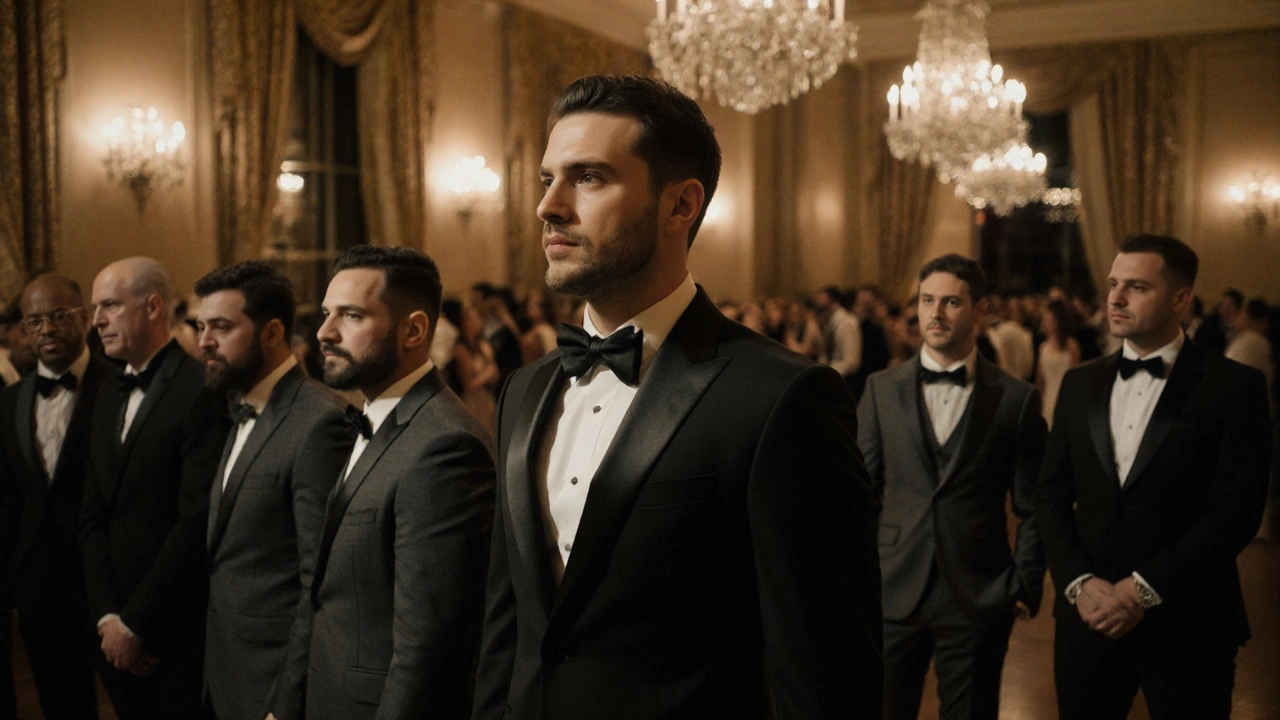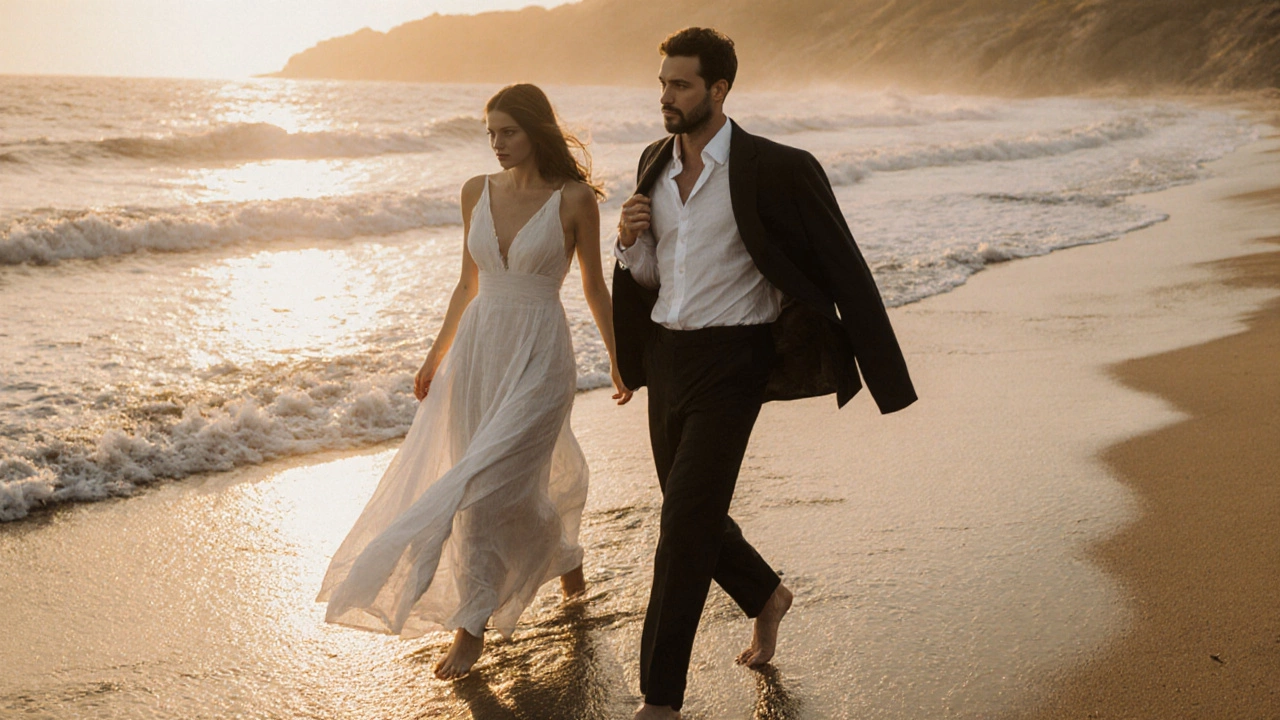Wearing a black suit to a wedding used to raise eyebrows. Now, it’s a quiet statement - stylish, confident, and increasingly common. But what does it actually mean when the groom shows up in black? Is it formal? Too bold? Out of place? The answer isn’t just about fashion - it’s about context, culture, and intention.
Black Suit vs. Black Tuxedo: The Difference Matters
People often say "black suit" and "black tuxedo" like they’re the same thing. They’re not. A black tuxedo has satin or silk details - lapel facing, side stripes on the pants, and a satin button. It’s designed for formal evening events. A black suit? No satin. Just wool or blend fabric, matte finish, standard buttons. It’s sharp, modern, and works for both day and night weddings. If the invitation says "black tie," you need the tuxedo. If it says "formal attire" or "dark formal," a black suit is not just acceptable - it’s often preferred. Many grooms today skip the tuxedo entirely because it feels outdated, stiff, or too much. A well-tailored black suit says, "I respect the occasion, but I’m not here to perform."Why More Grooms Are Choosing Black
In the past, white or light gray suits were the norm for grooms. But times changed. Modern weddings aren’t just church ceremonies with punch and cake. They’re personal. They happen on rooftops, in forests, on beaches. Grooms want to look like themselves - not like a 1980s movie extra. Black suits offer versatility. They look equally at home in a city hall ceremony as they do in a candlelit ballroom. They photograph beautifully - deep shadows, clean lines, no glare. Photographers love them. Brides love how they contrast with white dresses without competing. A 2024 survey by The Knot found that 37% of grooms in the U.S. chose black or dark suits over traditional tuxedos. That’s up from 19% just five years ago. Why? Because black feels intentional, not inherited.When a Black Suit Sends the Wrong Message
There’s a line between stylish and inappropriate. A black suit can look like mourning if worn in the wrong context. In some cultures, black is reserved for funerals. In others, it’s the default for business meetings. So context matters. If the wedding is a traditional religious ceremony - especially in conservative communities - a black suit might raise questions. In Catholic or Orthodox weddings, white or cream is often expected. In Jewish weddings, black is common but paired with a kippah and sometimes a shtreimel. In Hindu or Sikh weddings, black is rarely worn by the groom - bright colors are the norm. Always check the invitation’s dress code. If it says "semi-formal" or "cocktail attire," a black suit is perfect. If it says "white tie," skip it. And if you’re unsure? Ask the couple. Most will appreciate you caring enough to ask.
How to Style a Black Suit for a Wedding
A black suit isn’t just throw it on and go. It needs thought. Here’s how to get it right:- Fit is everything. A suit that’s too loose or too tight ruins the look. Tailoring costs less than a new shirt - spend the money.
- Shirt color? White is classic. Light gray or pale blue work if you want subtle contrast. Avoid patterns - no stripes or checks.
- Tie or no tie? Many grooms skip the tie entirely. A black suit with an open collar and no tie looks modern and relaxed. If you wear one, go for silk in charcoal, burgundy, or deep green. Avoid shiny or neon.
- Shoes? Black leather oxfords or loafers. No brown. No sneakers. No boots.
- Accessories? A simple pocket square in white or silk. A watch with a black band. No flashy cufflinks unless they’re part of your family tradition.
Black Suit Grooms in Pop Culture
You’ve seen them. Ryan Gosling in The Notebook, dressed in a sleek black suit for the reunion scene. Chris Evans in Knives Out, sharp and quiet. Even Prince Harry at his wedding - he wore a morning coat, but his groomsmen? All in black suits. These aren’t accidents. Hollywood and royalty know what works. Celebrities don’t wear black suits because they’re trendy. They wear them because they’re timeless. They don’t distract. They elevate. They let the bride shine without competing.What the Bride Thinks
Most brides don’t care if the groom wears black - they care if he looks like himself. One bride told me, "I didn’t want him to look like he was going to a funeral. I wanted him to look like he was going to marry me. His black suit did that. He looked calm. Confident. Like he knew what he was doing." A black suit doesn’t scream "look at me." It whispers, "I’m here for you." That’s why so many brides prefer it.
What About the Groomsmen?
If the groom wears black, what about the guys beside him? You don’t need matching suits. In fact, matching is outdated. Try this: all groomsmen in charcoal gray suits, the groom in black. Or all in navy, the groom in black. It creates depth - not uniformity. Some couples even mix textures. One groom wore a black wool suit. His groomsmen wore black linen. The difference showed in the light. It looked intentional. Not sloppy.Is a Black Suit Too Casual for a Wedding?
No - if it’s well-made and worn correctly. A black suit isn’t casual. It’s refined. Think of it like wearing a little black dress to a party. It’s not boring. It’s powerful. The real question isn’t "Is black too much?" It’s "Is this suit good enough?" If it’s off-the-rack and wrinkled, yes, it looks lazy. If it’s tailored, pressed, and paired with care? It’s the most elegant choice in the room.Final Rule: Match the Vibe, Not the Rules
Weddings aren’t governed by old rulebooks anymore. They’re guided by feeling. If the wedding has a moody, modern, minimalist vibe - black is perfect. If it’s bright, floral, beachy, or vintage - maybe skip it. Ask yourself: Does this suit reflect who I am? Does it honor the day? Does it let the bride take center stage? If the answer is yes, then black isn’t just acceptable - it’s brilliant.There’s no magic rule that says grooms must wear white. There’s only one rule that matters: show up as yourself, dressed with respect. And sometimes, that means wearing black.
Is it okay for a groom to wear a black suit to a daytime wedding?
Yes, absolutely. A black suit works for daytime weddings as long as the fabric isn’t too heavy. Opt for lightweight wool or linen blends. Pair it with a light shirt and skip the tie for a relaxed, polished look. Avoid shiny fabrics or tuxedo details - those are meant for evening.
Does wearing a black suit mean the groom is mourning?
Not at all. In Western cultures, black suits are now standard for formal events, including weddings. The association with mourning has faded in most places, especially among younger generations. What matters is the context: if the wedding is joyful, colorful, and celebratory, a well-styled black suit enhances that - it doesn’t contradict it.
Should the groom match his groomsmen in black?
No, and it’s often better not to. Many couples now choose a tonal palette - groom in black, groomsmen in charcoal, navy, or even deep green. This creates visual hierarchy without looking matchy-matchy. The groom should stand out slightly, not blend in.
Can I wear a black suit to a beach wedding?
Only if it’s lightweight. A thick wool suit will make you sweat and look uncomfortable. Choose a linen or cotton blend in black, go sleeveless if allowed, and skip the jacket during the ceremony. Many grooms opt for black chinos and a button-down shirt instead. The goal is comfort without sacrificing style.
What’s the difference between a black suit and a tuxedo for a wedding?
A tuxedo has satin or silk details - lapels, buttons, and pants stripes - and is meant for formal evening events. A black suit is all fabric, no shine, and works for any time of day. Tuxedos are traditional; black suits are modern. If the dress code says "black tie," wear the tuxedo. If it says "formal," the suit is often better.

